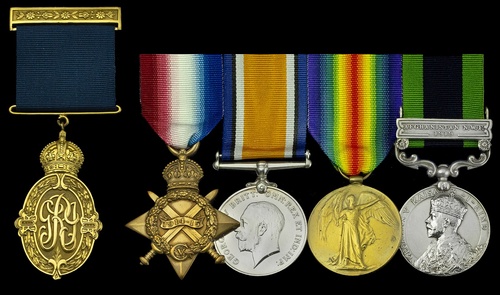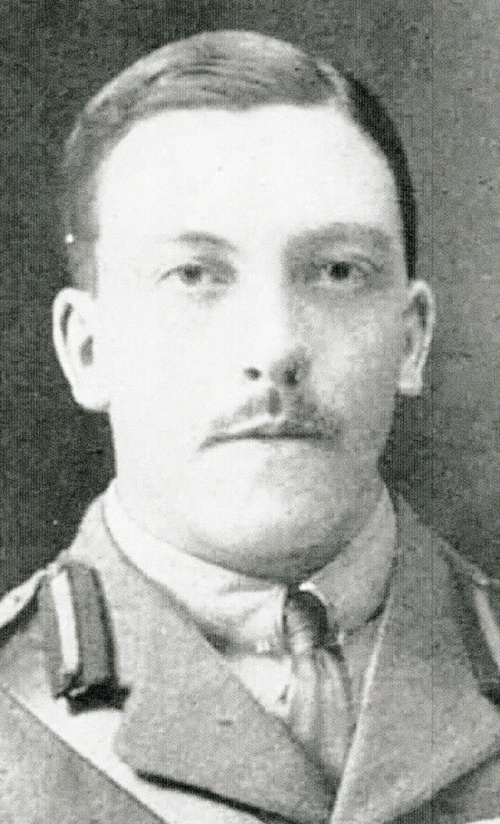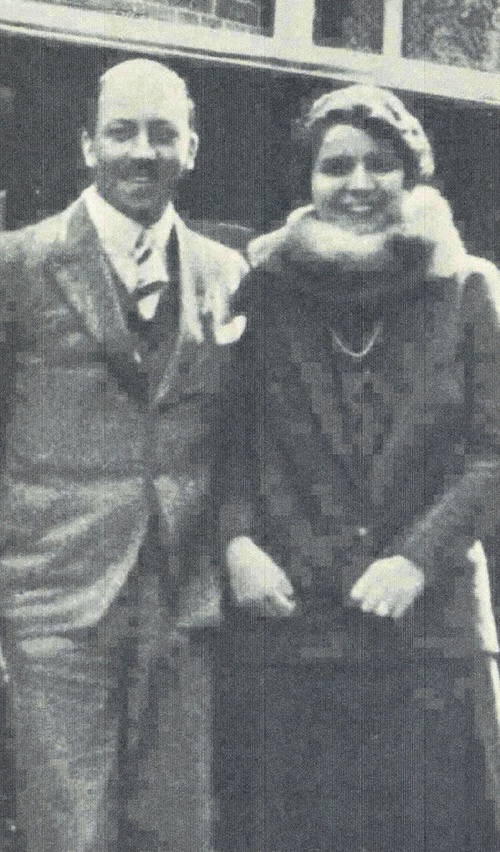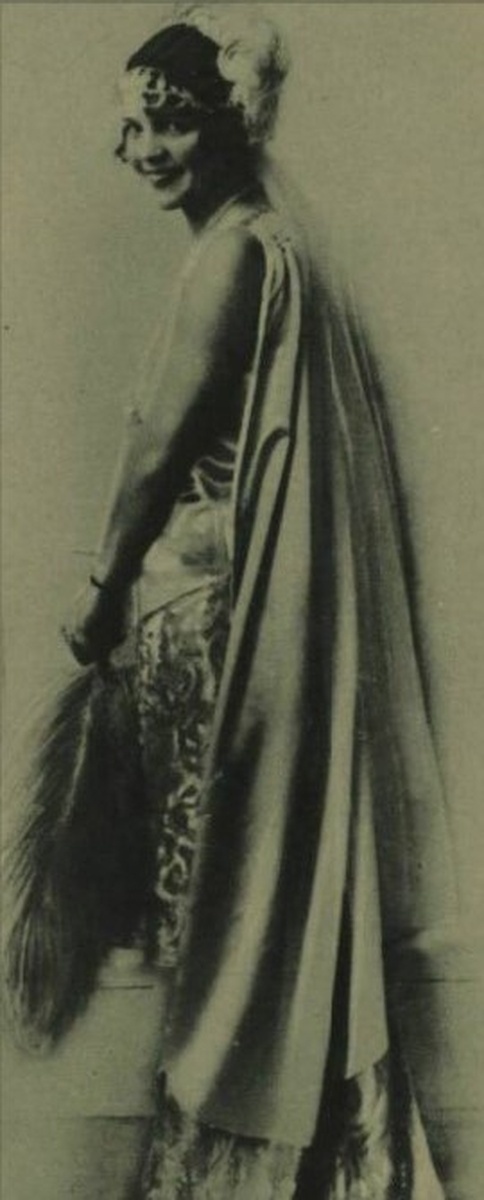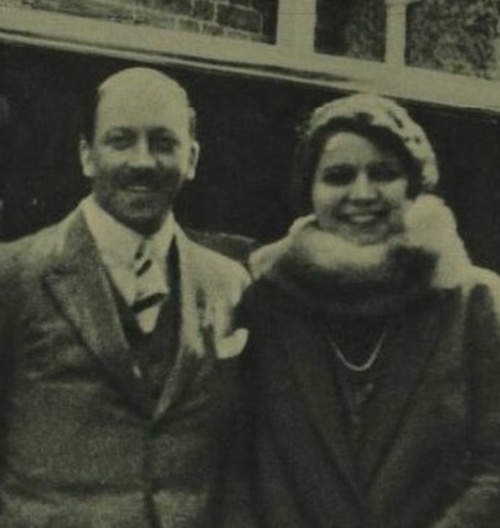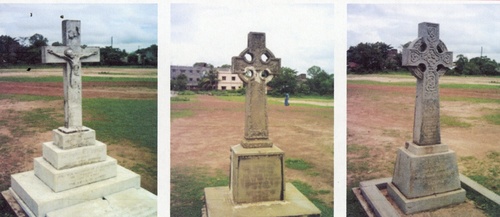Auction: 18003 - Orders, Decorations and Medals
Lot: 594
A poignant family group:
'Wherever he served, Mr. Burge was indomitably cheerful … and the courage with which Mr. Burge and his wife faced constant strain and went about their duties in the sure presence of danger was most marked.
His wife and daughter accompanied him to Midnapore, and Mrs. Burge spent all of her time in unfailing devotion to Mr. Burge and to his safety. She posted the guard round the house and would allow none to interview him unless she personally saw them first, and she would then accompany the visitors herself when they were interviewed. Mrs. Burge spent 18 months with Mr. Burge at Midnapore, which is the hottest station in Bengal. They were both ill, but took no leave, and were doing their best to improve conditions in the Midnapore District. Mrs. Burge often travelled in the district where no white women had gone before in her endeavour to do all she could for her husband's safety.'
The Times, Monday, 4 September 1932, refers; Mrs. Burge's goodwill was rewarded by the cold-blooded murder of her husband, who was shot dead whilst attending a community football match.
The Great War and Third Afghan War group of four awarded to District Magistrate H. J. Burge, Indian Civil Service, late London Regiment and Rifle Brigade, who was assassinated at Midnapore in September 1933
Against his wife's wishes - and displaying courage of a high order - he accepted the post of Magistrate at Midnapore in the disturbing knowledge that his two immediate predecessors had likewise been assassinated
A positive storm erupted in the pages of the press - in India and at home - following his own assassination, the Viceroy of India being quoted as describing Burge's murder as 'a brutal and senseless outrage'. It was a sentiment shared by representatives of the House of Lords, who questioned whether enough was being done to maintain his widow
1914-15 Star (Lieut. B. E. J. Burge, 3/Lond. R.); British War and Victory Medals (Lieut. B. E. J. Burge); India General Service 1908-35, 1 clasp, Afghanistan N.W.F. 1919 (Lieut. B. E. J. Burge, 22/Rifle Bde.), contact marks and polished, nearly very fine or better
The Kaisar-i-Hind Medal awarded to his widow, Mrs. Barbara Burge
Kaisar-i-Hind, 1st Class, G.V.R., gold, in its Hamilton & Co. case of issue, good very fine(5)
Bernard Edward John Burge was the younger son of Mr. and Mrs. J. E. Burge of Wimbledon and was educated at Ampleforth and Merton College, Oxford.
Baptism of fire
Commissioned 2nd Lieutenant in the 2/3rd (City of London) Battalion, Royal Fusiliers, in September 1914, he was embarked for Gallipoli in September 1915, where he witnessed active service in the period leading up to the Battalion's evacuation to Mudros at the year's end. Battle casualties were much aggravated by the 'Great Thunder Storm' of 25 November 1915, when No Man's Land was turned into a lake - 'standing up on the firestep, the men were up to their waists in water'. Many suffered as a result of the blizzard that followed: 50 drowned or died of exposure and over 300 were evacuated with frost bite.
Burge transferred as a Temporary Lieutenant to the 23rd (North Western) Battalion, The Rifle Brigade, in November 1916 and was likewise employed at the time of his participation in operations during the Third Afghan War in 1919 (Medal & clasp). Latterly an Assistant Provost Marshal in India, he resigned his commission in September 1921 to pursue a career in the Indian Civil Service.
Hijli Detention Camp
Burge was clearly a popular and gifted administrator, engaging in local community life and winning wide approbation for his prowess as a cricketer. He laying for the Stragglers of Asia and captained the Ballyganj Cricket Club, Calcutta.
He eventually became a Settlement Officer in Bengal and, as reported in The Times on 4 September 1933, he next appointed to the command of the Hijli Detention Camp for political prisoners in Midnapore West. His appointment came hot on the heels of serious disturbances in the camp, including what became known to Indian nationalists as the 'Hijli firing', on which occasion two detainees were shot by the police; significant protests followed the incident, the Nobel Laureate Rabindranath Tagore being among those to voice their concern.
Assassination - 'His loss to Bengal at the present juncture is an irreparable tragedy'
It was in just such a trained climate - and following the assassination of District Magistrates Mr. Peddie in April 1931 and Mr. Douglas in April 1932- that Burge accepted the offer to take-up the same role at Midnapore.
His own assassination, 18 months later - he was gunned down in cold-blood - quickly hit the headlines throughout India and the home press:
'The murder of Mr. B. E. J. Burge is one of the most insensate, unprovoked and cowardly crimes ever committed. The gentleman went to the Police Club ground to watch a football match. He went a guest to mix freely with Indians and every law of God and man was violated by the criminals killing him.
Only a few days ago His Excellency the Viceroy assured the Assembly that the terrorist movement was completely under control though it was not yet dead. He referred with satisfaction to the absence for some months of this sort of crime. The Secretary of State on the debate in the India Office a few weeks ago assured Parliament that Government had got level with anarchism and caught it by the throat. Sir John Anderson, the Governor of Bengal, has also assured the Secretary of State that strong measures taken by him had had the desired effect and that he would not relax his grip of the anarchist movement … '
Similar newspaper reports spread the length and breadth of India, such statements containing much admiration for Burge; conversely, his assassins were the subject of much anger and scathing commentary. Their 'dastardly outrage' sunk to 'the level of the lowest savagery'.
At a moving address given at the Calcutta Corporation, the speaker - Mr. F. Rooney - said:
'Mr. Burge was peculiarly endowed with those qualities which go to make a natural leader and administrator. To a keen sense of humour, and a frank and happy disposition was added, an instinctive sympathy, a broadness of outlook and understanding, combined with a constant urge to know and to understand the people with whom he came in contact, in order that he might the better assist them in their trials and difficulties. It is in the irony of things that his desire to know and be known by the youth of the district in which he was stationed should have led to this dreadful tragedy. He had for many years given up playing football but, quick to realise the possibilities of personal contact on the field of sport, he took up the game again, with what result we all know. Mr. Burge was the type of man who can ill be spared at any time. His loss to Bengal at the present juncture is an irreparable tragedy.'
Mr. Rooney then turned to security matters:
'It is difficult for us in the twentieth century to realise that any man should be required to carry out his duties under conditions such as faced Mr. Burge at Midnapore. In this connection I cannot do better than quote an extract from a statement written by a friend who stayed with the Burges for a few days only a week or two ago. He says: "The bungalow's sentries were always on the alert. It was the bodyguard's business to accompany Mr. Burge wherever he went during the day and to sleep within a few feet of him during the night. Sentries patrolled round the house day and night. The end of it all has shown how necessary these precautions were but how impossible it is to guarantee absolutely the safety of an official who insists on doing his each and every duty, and much more than his essential duty." This was the daily life, not of a soldier living in a country in a state of war, but of a civil official performing just his daily round, the common task, with the shadow of death as a constant companion, simply because he was doing his job.'
Comparable addresses were given at the Madras City Council, the Bengal National Chamber of Commerce and elsewhere. Such addresses - and a host of related newspaper reports - were subsequently published by the Bengal Government Press at Calcutta (1934); see the Centre of South Asian Studies (Archives Project), for an original edition donated by H. C. V. Philpot in 1967 - a copy is included.
Two police officers who had also turned out for the football match - Philip Norton and Charles Oliver Smith - rushed the assailants, taking one man each: 'Both officers showed complete disregard of personal danger. One assassin actually pointed his pistol at Mr. Jones who, however, was able to knock it downwards, and the bullet passed between his legs.' One of the assailants was killed on the spot and the other later died of wounds received. Another survived.
Norton and Oliver Smith were awarded the K.P.M.
Further terrorists - part of the same conspiracy - were rounded-up. Three were sentenced to death, four sentenced to transportation for life, and four acquitted. The executions were carried out at Midnapore central Jail in October 1934.
Burge's widow - Barbara Mary Isobel Burge - was awarded the 1st Class Kaisar-i-Hind Medal in respect of her dedicated and courageous service in Midnapore. The award was announced in The London Gazette on 1 January 1934; questions as to how she was being looked after by the Government of India had been raised in the House of Lords in the previous year.
Sold with an extensive file of copied research.
Please see Lot 786 for Mrs. Burge's miniature dress Kaisar-i-Hind Medal.
Subject to 20% VAT on Buyer’s Premium. For more information please view Terms and Conditions for Buyers.
Sold for
£1,800

